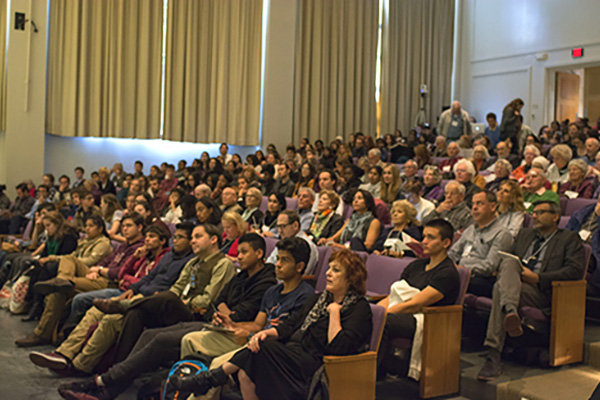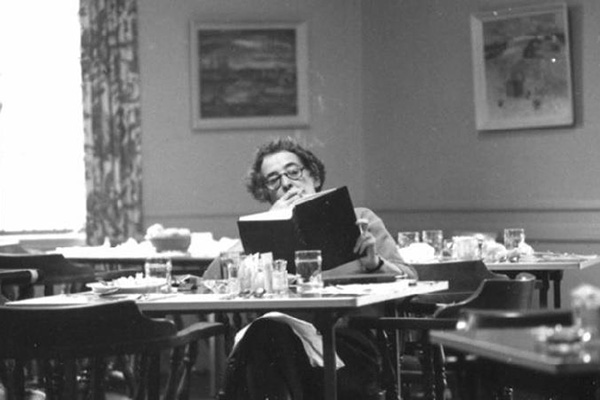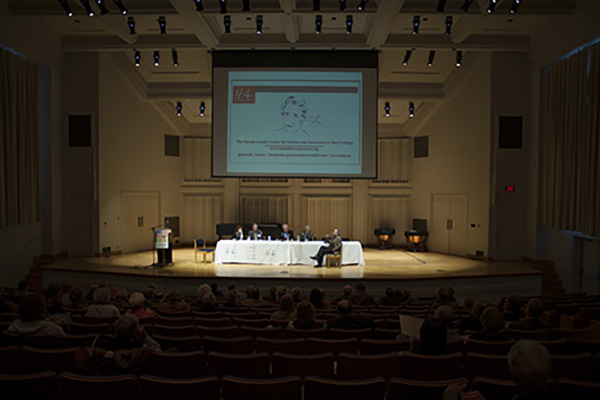HAC Annual Conference "Racism and Antisemitism"
From The Origins of Totalitarianism to The Crises in Little Rock, Arendt’s thinking on race is controversial and has often led many to quickly dismiss her thoughts on race and antisemitism entirely. The Hannah Arendt Center’s 12th annual conference on “Racism and Antisemitism” explored these oft shunned concepts in Arendt’s work in the context of our contemporary political moment, which is marked by antisemitic and racist violence.
HAC Symposium: Reimagining Human Health
Over the last century, infectious diseases faded from view as the greatest threat to human health. During the same period, chronic inflammatory and noncommunicable diseases like asthma, Alzheimer’s, lupus, arthritis, Crohn’s, IBD, celiac disease, obesity, and others have increased exponentially; noncommunicable diseases now account for over 60 percent of all deaths. New research also points to these environmental factors’ impact on the human microbiome. The Hannah Arendt Center at Bard College, along with the Bard Farm, Bard EATS, and the Bard Center for Environmental Sciences and Humanities, sponsored an interdisciplinary symposium to ask how it is we can teach and work to address the crisis posed by the threat to the human microbiome.
HAC Annual Conference: "Crises of Democracy: Thinking in Dark Times"
Democracy is weakened when citizens are encouraged to hand over the time-consuming work of self-government to professional politicians. Arendt was continuously critical of representative models of democracy that rely upon experts in place of participation, which is why she rooted the crisis of democracy in the dissipation of public power. The disempowerment of the people in representative democracy embraces a bourgeois preference to pursue individual interests, to be relieved of the duty of politics and public virtue. But as we have seen recently, this separation between citizens and government has only further weakened the principles of liberal, representative democracy.
HAC Annual Conference: "Why Privacy Matters"
Reading on Kindles, searching Google, and using cell phones, we leave a data trail of intimate details. Governments and businesses track our comings, goings, and doings. Scott McNealy, former CEO of Sun Microsystems, speaks for many when he says, “You have zero privacy anyway. Get over it.” It is easy to note the violence of the slogan “if you have nothing to hide, you have nothing to fear,” but few offer an intelligent response. Why do we willfully participate in the loss of our privacy? How is it that we rarely register its loss? Do we simply value privacy less? It is time to ask why privacy matters?
HAC Annual Conference: "The Unmaking of Americans: Are There Still American Values Worth Fighting For?"
The two-day conference, “The Unmaking of Americans” asked what aspirations and which dreams still animate American idealism. Americans must confront the weakening of a collective vision of freedom and equality. And yet few dare to articulate a collective vision that might hold the country together. America has long imagined itself a “city upon a hill.” Yet, we confront a weakening of our collective vision.
Courage to Be
Dinner and Lecture Series
The program hosts guest lectures, sponsors new research, and fosters curricular innovations that ask: Why it is that some people have the spiritual courage to act conscientiously, where others abandon themselves to mass movements?
The Project includes fellowships for young scholars; lectures by internationally renowned experts; and A new series of courses titled "The Practice of Courage."
Tough Talks Lecture Series
A premise of Arendtian thinking is an embrace of plurality. Plurality is the condition of speech and action by which we appear to others as ourselves in the world. Plurality is the fact that people live in their own way, worship different gods, pursue different ideals, and associate with different people. Amidst such plurality, political life is where we come together in common, embracing what unites us amidst our differences. Plurality is thus a condition of politics, since politics is a discussion amongst a plurality of individuals with different opinions, not a search for a single truth. To do away with plurality would be to do away with the public realm of politics altogether.
Eichmann in Jerusalem
From the publisher:
Sparking a flurry of heated debate, Hannah Arendt’s authoritative and stunning report on the trial of German Nazi leader Adolf Eichmann first appeared as a series of articles in The New Yorker in 1963. This revised edition includes material that came to light after the trial, as well as Arendt’s postscript directly addressing the controversy that arose over her account. A major journalistic triumph by an intellectual of singular influence, Eichmann in Jerusalem is as shocking as it is informative—an unflinching look at one of the most unsettling (and unsettled) issues of the twentieth century.
Crises of the Republic
From the publisher:
Taking an in-depth look at the tumult of the 1960s and ’70s, one of the great political philosophers of our era examines how these crises challenged the American form of government. “Lying in Politics” is a penetrating analysis of the Pentagon Papers that deals with the role of image-making and public relations. “Civil Disobedience” examines various opposition movements, from the Freedom Riders to the war resisters to the segregationists. And in two additional essays, Hannah Arendt delves into issues of revolution and violence.
Rahel Varnhagen: The Life of a Jewess
From the publisher:
She was, Hannah Arendt wrote, "my closest friend, though she has been dead for some hundred years." Born in Berlin in 1771 as the daughter of a Jewish merchant, Rahel Varnhagen would come to host one of the most prominent salons of the late eighteenth and early nineteenth centuries. Arendt discovered her writings some time in the mid-1920s, and soon began to reimagine Rahel's inner life and write her biography. Long unavailable and never before published as Arendt intended, Rahel Varnhagen: The Life of a Jewess returns to print in an extraordinary new edition.
The Origins of Totalitarianism
From the publisher:
The Origins of Totalitarianism begins with the rise of anti-Semitism in central and western Europe in the 1800s and continues with an examination of European colonial imperialism from 1884 to the outbreak of World War I. Arendt explores the institutions and operations of totalitarian movements, focusing on the two genuine forms of totalitarian government in our time—Nazi Germany and Stalinist Russia—which she adroitly recognizes were two sides of the same coin, rather than opposing philosophies of Right and Left. From this vantage point, she discusses the evolution of classes into masses, the role of propaganda in dealing with the nontotalitarian world, the use of terror, and the nature of isolation and loneliness as preconditions for total domination.
The Human Condition
From the publisher:
A work of striking originality, The Human Condition is in many respects more relevant now than when it first appeared in 1958. In her study of the state of modern humanity, Hannah Arendt considers humankind from the perspective of the actions of which it is capable. The problems Arendt identified then—diminishing human agency and political freedom, the paradox that as human powers increase through technological and humanistic inquiry, we are less equipped to control the consequences of our actions—continue to confront us today.



